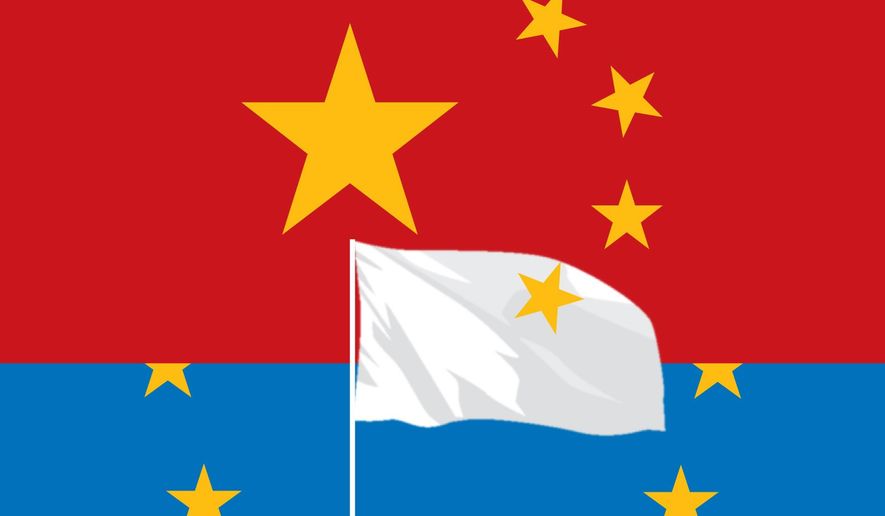OPINION:
The challenges facing what we used to call, with pride and confidence, the Free World are daunting. Illiberal authoritarians of various stripes are increasingly assertive and audacious.
In response, Americans and Europeans should be working more closely and cooperatively than ever. They’re not.
The explanation commonly given: Relations between President Trump and his counterparts across the pond have been strained. He hasn’t shown them the respect they deserve. They’ve not concealed their disdain for him.
Still, it is surely in the European Union’s interest to defend its members from the machinations of illiberal authoritarians. And it is surely not in the EU’s interest to undermine Mr. Trump’s successor. Yet the EU is not doing the former and is doing the latter. Give me a few moments to make the case clearly.
The world’s most powerful and ambitious illiberal authoritarians are in Beijing. They are brutally oppressing dozens of ethnic and religious minorities within the borders of the People’s Republic of China, not least the Uighurs, a Turkic and Muslim nation. More than a million Uighurs are being “re-educated” and subjected to forced labor in concentration camps.
The PRC has violated the “one country, two systems” principle it had pledged — in a treaty, the bedrock of international law — to maintain for the people of Hong Kong. Last week, a government-directed court revoked bail and threw back into jail publisher and democracy activist Jimmy Lai. Another such court sentenced to prison 10 Hong Kongers who had attempted to flee to Taiwan by boat. Is any human right more basic than the freedom to leave?
The PRC is the world’s leading thief of intellectual property. Its spies are everywhere (including the U.S. Congress). The emergence of a deadly and destructive pandemic from China (likely from a government-run virology laboratory in Wuhan) was followed by Beijing’s multiple misrepresentations combined with its manipulation of the World Health Organization.
China’s rulers have been provoking bloody territorial clashes with India, building militarized artificial islands in the South China Sea so as to claim international waters as their own, disputing Japan’s possession of the Senkaku Islands in the East China Sea, economically bullying Australia and militarily threatening Taiwan.
The free nations of Europe should — at a minimum — be expressing outrage and rethinking their relations with Beijing. Instead, the PRC has just been awarded a seat on the U.N. Human Rights Council. Voting is by secret ballot so we don’t know which European nations voted in favor. We do know that not one European nation issued a word of protest.
Perhaps worse — it’s a tough call — the European Union last week agreed in principle on a new investment accord that, if ratified, promises to further bind Europe’s economy with China’s.
European deal defenders insist it’s a win because President Xi Jinping committed to environmental protections, ending forced technology transfers and increasing transparency over the subsidization of state-controlled enterprises.
But after what Mr. Xi has done in Hong Kong with impunity, why would anyone believe that he will honor new commitments or that there will be consequences if he does not?
“Leaders in both U.S. political parties and across the U.S. government are perplexed and stunned that the EU is moving towards a new investment treaty right on the eve of a new U.S. administration,” Deputy National Security Adviser Matthew Pottinger told a group of international legislators last week.
He added: “The EU Commission’s haste to partner with Beijing despite its grotesque human rights abuses has removed a fig leaf. Some European officials and commentators liked to claim that the Trump Administration was an impediment to even deeper transatlantic cooperation. Now it is plain to all that this isn’t about President Trump. It’s about key European officials. Look in the mirror.”
Jake Sullivan, whom President-elect Joe Biden has anointed as his national security adviser, also signaled his discomfort, albeit less bluntly, tweeting that the new administration “would welcome early consultations with our European partners on our common concerns about China’s economic practices.”
Atlanticists and Europhiles — I consider myself both — have to be deeply disappointed with the EU. But we can’t be surprised. The bloc’s prospective new deal with the Chinese Communist Party fits a distressing pattern.
The Kremlin has appropriated territory from its neighbors, and been implicated in recent assassinations and assassination attempts in Europe and on Russian soil. Nevertheless, and despite objections by both the Obama and Trump administrations, Germany is proceeding with Nord Stream 2, an energy deal that will increase European dependence on Russia.
Our European allies also have been consistently conciliatory toward the Islamic Republic of Iran, despite its attempt, fortunately foiled, to bomb a gathering of dissidents in Paris in 2018, its missile attacks against Saudi Arabian oil facilities in 2019, the execution of journalist Ruhollah Zam last month, continuing hostage-taking and numerous violations of the Joint Comprehensive Plan of Action, the nuclear deal from which Mr. Trump withdrew while Germany, France, Britain and the EU remained.
And for decades, most European members of NATO have been making only minimal contributions to the collective military security of the Atlantic alliance.
Mr. Biden has said he hopes to restore and revitalize relations with our European friends. We should support that effort — so long as his approach is not to get along by going along, failing to seriously push back against the European Union’s serial capitulations to illiberal authoritarians — rivals and adversaries of what we used to call, with pride and confidence, the Free World.
• Clifford D. May is founder and president of the Foundation for Defense of Democracies (FDD) and a columnist for The Washington Times.




Please read our comment policy before commenting.